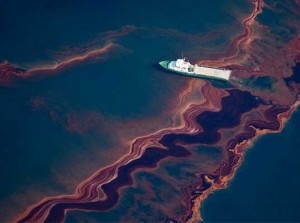Response: Oguz, Can “Business Ethics” & the BP oil spill
by LucyStephenson
Today, there is cutthroat competition between businesses to increase their market share, reputation and revenue. As we know, ambition and competitiveness are crucial to be successful, but there must be regulations to prevent immorality and unethical behaviours. Trustworthiness and credibility are essential for a business to maintain their success, if a company loses it, then their brand image could be hurt which would result as a decline in their revenue. There are many huge companies that didn’t follow the business ethics and faced with protests and boycotts against them.
For example BP was protested for causing “one of the worst environmental disasters ever happened, the Deepwater Horizon oil spill in the Gulf of Mexico. Greenpeace played a significant role by starting a boycott against them by using media tools to increase awareness” (Greenpeace, 2010) The disaster was extreme, causing 11 mortalities and 5 million barrels of Oil to spill into the Water.
The main ethical implication with the BP oil spill, is the information that was released to the public. BP tried to keep the incident out of the publics awareness for a while, however i believe BP had the ethical responsibility to make people aware of what has happened. They restricted the press to gain access near to the site, therefore not being able to report on the damages that had been done to wildlife, ecosystems and the general environment. During the time, no laws existed for the protection of wildlife, however I believe that BP could have attempted to replenish its image by standing up for its mistakes and helping Greenpeace create laws and regulations in the place of wildlife protection.
Hence, BP’s attempt to increase market share, reputation and revenue backfired, as they did not act ethically after the spill, rather attempted to cover it up.
https://blogs.ubc.ca/ocgenc/ – Oguz, Can
“Current List of Consumer Boycotts.” Current List of Consumer Boycotts. EthicalConsumer, 7 Oct. 2013. Web. 29 Sept. 2014. <http://www.ethicalconsumer.org/boycotts/boycottslist.aspx>.
Greenpeace. “The BP Oil Spill: One Year Later.” Greenpeace. GreenpeaceUSA, n.d. Web. 29 Sept. 2014. <http://www.greenpeace.org/usa/en/news-and-blogs/news/The-BP-Oil-Spill-One-Year-Later/>.
Malik, Stephanie. “Practical Ethics.” Practical Ethics. University of Oxford, 29 June 2010. Web. 29 Sept. 2014. <http://blog.practicalethics.ox.ac.uk/2010/06/ethical-questions-surrounding-the-bp-oil-spill/>.
“Study Shows BP Oil Spill Could Have Been Prevented by Regulation.”Inhabitat Sustainable Design Innovation Eco Architecture Green Building Study Shows BP Oil Spill Could Have Been Prevented by Regulation Comments. Inhabitat, 10 Aug. 2010. Web. 29 Sept. 2014. <http://inhabitat.com/study-shows-bp-oil-spill-could-have-been-prevented-by-regulation/>.
